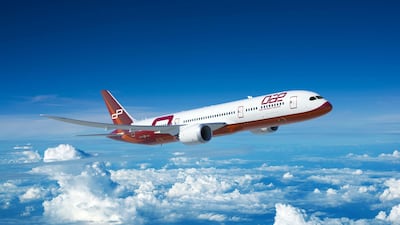Dubai Aerospace Enterprise, the Middle East’s biggest plane lessor, is optimistic but vigilant after posting a lower first-half net profit amid a divergent recovery in air traffic demand across markets, the emergence of new Covid-19 strains and the uneven distribution of vaccines.
Net profit for the first six months through to the end of June dropped to $49 million, from $121.7m in the same period a year earlier, DAE said on Wednesday. First-half revenue also fell to $613.4m, from $675.9m a year earlier.
"Recovery in passenger air traffic demand is progressing well but not evenly in all jurisdictions and for all aircraft types,” said DAE chief executive Firoz Tarapore.
“The uneven nature of vaccine deployment geographically and the emergence of virus variants remain a barrier to a predictable return to full normality.”
Available liquidity at the end of the first six months of the year climbed to $4.09 billion, from $2.69bn a year earlier. Operating cash flow rose to $498.5m from $432.2m for the period while fleet use also improved marginally to 99.1 per cent, the company said.
Despite sporadic air traffic recovery and coronavirus-induced headwinds for the aviation industry, one of the worst affected sectors of the global economy, DAE remains bullish about growth prospects in the second half of the year.
In June, credit rating agency Moody’s Investors Service revised DAE's outlook to “stable”, from “negative”, and affirmed its "Baa3" issuer rating, citing the company's strong liquidity position and capital management, and signs of a recovery in air travel.
The balance sheet remains strong, with "high levels of capital adequacy and exceptional levels of available liquidity”, the plane lessor said on Wednesday.
In April, DAE signed an agreement for the order of 15 Boeing 737 Max-8 jets valued at about $1.8bn at list prices. However, buyers usually receive discounts on the final price.
In July, DAE Capital, the company's leasing division, signed agreements to sell nine narrow- and wide-body aircraft valued at $500m. The transactions are expected to close in 2021, DAE said on Wednesday.
Overall, DAE has committed to purchase 26 aircraft and sell 27 others during the first six months of the year, it said.
“Our financial results for the first half of 2021 reflect strong origination of new technology, fuel-efficient narrow-body aircraft and a robust environment for sales of aircraft assets,” said Mr Tarapore.
“We placed a direct order with Boeing … to meet our customers’ requirements for modernising and upgrading their fleets.”
DAE, which is owned by the Investment Corporation of Dubai, raised $1bn from the debt market in June. This was its second funding deal after having raised $1.25bn in a two-tranche sale of unsecured bonds in January.
The company also sold $750m in Islamic bonds, or sukuk, in November last year.



